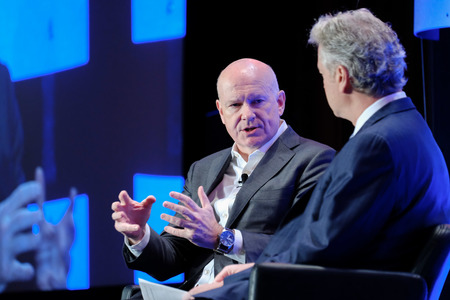The state of journalism was front and center at the Page Society Spring Seminar, beginning with an interview with Wall Street Journal editor Gerry Baker. In a remarkably candid conversation, Baker acknowledged that the news media's reportage – his own paper included – can fail to realize its natural tendency to focus on issues that aren't at the fore between the coasts. Bringing light to immigration, transgender rights and gay marriage are certainly important social issues, but in Baker's view, the press – and at the same time, the political establishment – has failed to fully appreciate how disaffected and marginalized at least half of the U.S. is in the current economic environment.
Echoing that point was CNN commentator Sally Kohn, who previously appeared on Fox News debating conservative pundits. She expressed her fear that we lack civility in our discourse, and are too predisposed to demonize and hate the so-called "other side." "You can't argue with feelings," she said, "but when feelings are damaged, it's more difficult for persuasion to happen. So it's important to affirm peoples' feelings even if you don't validate their point of view." At the same time, she points out that the rate at which people defriend people on social media due to their opposing political views is on the rise – a troubling reinforcement of the media echo chambers that we can now choose to live in.
Getting back to Baker, his comments were remarkably similar to those of former GE chief executive Jack Welch, who was on the same stage two years before. Welch noted then that the relationship between CEO and CCO is based on "truth and trust." So, too, is the relationship between CCO and media, said Baker. While it has been forever the case that spokespersons, political leaders and others have been "economical with the truth," there is concern that the boundaries have shifted closer to outright lies – and that reporting misinformation as a lie, which insinuates actual intent to deceive, is a complicated issue for journalists. But take heart, he says – the story of those student journalists in Kansas who exposed the false credentials of their new principal, ultimately leading to her ouster, bodes well for the survival of the foundational essence of journalism – to seek truth and bring it to light.
Speaking of which, the Page Society issued a rare public statement amid all this discussion, affirming our dedication to the truth – it's the first Page Principle – and acknowledging that both PR professionals and journalists share in common the obligation to pursue the truth. Page president Roger Bolton shared his perspective on the statement from the conference stage, and later in the day sat down with Gary Sheffer to discuss the importance of speaking out.
That's all well and good, but it's no secret that for every honest reporter running down a story, there is a propaganda machine churning out blatantly false news stories dressed up as real news. "There are best practices for fake news," said Adam Singolda, CEO of Taboola. It's gotten very adept at looking like the real thing. But the true challenge, especially for media platforms – news, search and social alike – is to separate the real from the fake. As individuals, we have to make smart choices. "Nobody eats sushi on a plane," Singolda added. And nobody would feel bad if you got sick doing so. But on the distribution side, that's something that no algorithm can do reliably – at least not yet. Nevertheless, the real heroes in media, according to Singolda, are the ones who resist the temptation to pay attention to fake news "clickbait," rejecting the business value of those eyeballs in favor of the real value of maintaining trust.
In one of the more powerful presentations, Tamika Mallory, one of the organizers of the Women's March that followed the presidential inauguration, implored the audience to think about themselves as activists, because in some form or another, we all are. As communicators, we bear the responsibility to ensure that brands are true to their values while being sensitive to cultural and social issues. It can be easy for those at the top of an organization to think they know it all, she said, but it's impossible to know what you don't know about the experience, feelings and perspectives of other people. "In your companies, there's someone working in the kitchen that you can run stuff by. Do it. They'll be happy to tell you." Companies can only benefit from welcoming and considering diverse perspectives rather than succumbing to arrogant groupthink.
"Activists are passionate people who are fed up," she added. But that passion must be directed at revealing the truth rather than stifling it. The media decides which parts of the issues to show us, but anyone on social media – journalists, bloggers and others – are bringing these realities to light. "Telling those stories truthfully is activism."
